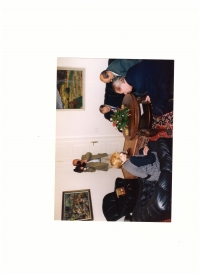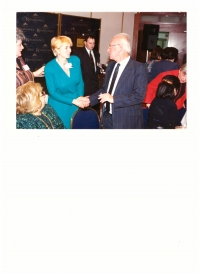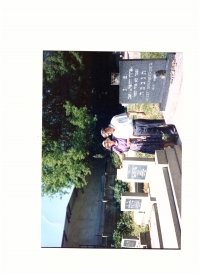“Remember the past, live the present and believe the future”
Download image
She was born on April 10, 1947 in Košice to parents who both survived a concentration camp. The entire original families of mother’s Lea Kupferstien (Jewish name Lea Bat Mešulam Fisch), later Grossman’s and father Michal Grossman’s (Jewish name Mechl Ben Isruel), were murdered in concentration camps. Martina’s mother was located in Tehelňa with the whole family and also had a tattoo number A 9944. Her father was not marked with a number. After returning from the concentration camps, these two people met and formed a new family, whose descendants are Marta (Jewish name Miriam Rajze Bat Lea) and her brother Alexander (Jewish name Isruel Ben Mechl). Both parents came from strongly devout Jewish families, of whom there were about thirty in Košice after their return. Mother Lea was the daughter of František Kupferstien and Miriam Katz. She had a brother, Josele, whom she lost in Auschwitz. Marta’s father, Michal, came from the village of Vyšné Bystré (today in Ukraine) and had 8 siblings, of whom only the youngest sister Malvína survived the Holocaust. He had a bakery in Košice. In his hometown, he attended only the Chajder Jewish school, so he did not speak Hungarian or Slovak well, he spoke Yiddish most of his life. After their deaths, both parents were buried in the Košice Jewish cemetery. In spite of the bad experiences of the war, the Grossman family remained a very pious family. She mentioned this mainly, because many Jewish families who managed to survive the concentration camps refused to continue to believe in the God who left them when they needed him most. Marta’s parents claimed that faith was in them, so they did not want to give it up. However, professing their religion was very difficult at that time. We are talking about the fifties of the last century, which were difficult times already in the dictatorship of communism, fabricated political processes. If her mother wanted to light candles on Friday nights, they had to pull down all the blinds so that no one would denounce them. Not so much in her father, but there was still great fear in her mother. Marta also has very sad memories of her youth. With tears in her eyes, she remembers the moments when she was at a service in the synagogue on Puškinova Street in Košice. Especially from the women’s gallery, during the Mazkir prayer, there was a terrible crying, howling and sobbing, which spread throughout the synagogue. “It can’t be described in words.” Daughters, mothers, sisters, wives could not come to terms with the loss of their loved ones during the Holocaust. Marta Grossmanová, later Györiová, is still a very active woman. Her big dream was to become a teacher, and her dream came true. Her love life was not simple, but on the other hand full of love and determination. At the age of fourteen, she met her future husband while bathing in Čani in Košice. Her husband, Ondrej Györi, nicknamed Bandy, graduated from a training college, then he made money by repairing typewriters, later computers. He was not a Jew, he was an unbeliever, an atheist. And that was a big stumbling block for Marta’s father. After a painful journey, after many lies, a wedding took place. She was married at the age of eighteen, on October 25, 1965. They have two children, sons Robert and Peter. In 1968, Brother Alexander moved to Israel, from where he has never returned home. His new home became Israel, where he based a new family, he has four children and thirteen grandchildren. He is a happy and proud father and a grandfather. Marta also toyed with the idea of moving to Israel, but her parents were very old and sick, so she stayed because of them. She was and still is in contact with her brother. Marta Györiová, she spent all her life as a teacher. Firstly a young teacher, later a seasoned principal, and finally she also worked on school projects for Romanies and projects for teachers and students: “How to teach about the Holocaust” as an external worker of the Ministry of Education of the Slovak Republic. She is the foundress of the civic association, Association ESTER, which is an organization of Jewish women in Slovakia. At the same time, this organization is also one of the 44 branches of the worldwide organization of Jewish women ICJW / International Council of Jewish Women.


